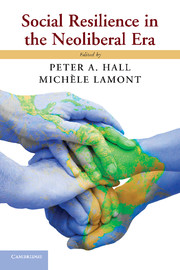Book contents
- Frontmatter
- Contents
- Contributors
- Foreword
- Prologue
- Acknowledgments
- Introduction
- Part I Neoliberalism
- Part II The Social Sources of Individual Resilience
- Part III Social Resilience on a Macro Scale
- 7 Neoliberalism and Social Resilience in the Developed Democracies
- 8 National Differences in Population Health and Development
- PART IV Communities and Organizations as Sites for Social Resilience
- Index
- References
7 - Neoliberalism and Social Resilience in the Developed Democracies
Published online by Cambridge University Press: 05 May 2013
- Frontmatter
- Contents
- Contributors
- Foreword
- Prologue
- Acknowledgments
- Introduction
- Part I Neoliberalism
- Part II The Social Sources of Individual Resilience
- Part III Social Resilience on a Macro Scale
- 7 Neoliberalism and Social Resilience in the Developed Democracies
- 8 National Differences in Population Health and Development
- PART IV Communities and Organizations as Sites for Social Resilience
- Index
- References
Summary
History flows in streams that overlap and sometimes shift direction. From the early 1980s, just such a shift was discernible in the history of the developed democracies. For thirty years after World War II, their states took on greater roles in the allocation of resources as governments anxious to avoid the social conflicts of the inter-war years adopted activist economic policies and generous social benefits to construct a Keynesian welfare state (Offe 1983; Eichengreen 2007). However, economic recession and slower rates of growth during the 1970s gave rise to widespread disillusionment with existing modes of policymaking. In reaction, policymakers began to argue that employment was the responsibility of markets rather than governments and growth could be restored only by expanding the ambit and competitiveness of markets (Hall 1993; McNamara 1998: Blyth 2002).
The pioneering steps were taken by governments elected under Margaret Thatcher in 1979 and Ronald Reagan in 1980. In the context of widespread fears about national decline, they promised to restore the prosperity of the nation by enhancing the role of markets vis-à-vis the state in the economy (Krieger 1986). Paradoxically, the initial requirement was a more assertive state (Gamble 1988). The two administrations initiated legislation to reduce the power of trade unions and fought high-profile battles with British miners and American air controllers. In the name of deregulation, they privatized national enterprises, contracted out public services, tightened social benefits, and made many markets more competitive (King 1987; Vogel 1998; Prasad 2006).
- Type
- Chapter
- Information
- Social Resilience in the Neoliberal Era , pp. 209 - 238Publisher: Cambridge University PressPrint publication year: 2013
References
- 11
- Cited by



